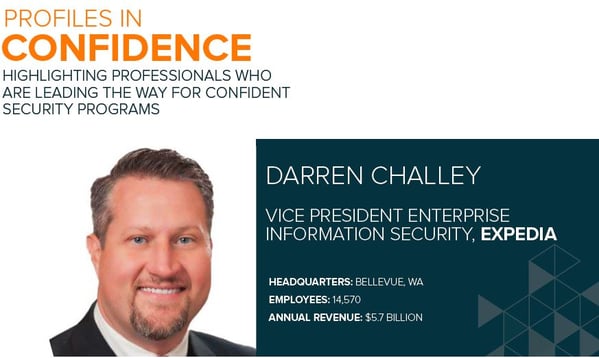
THE DIFFERENCE BETWEEN A LEADER AND A MANAGER
During his four year tenure as Vice President of Enterprise Information Security at Expedia, Darren Challey retained a team of top caliber talent in an increasingly competitive market, improved capability of delivery, and increased transparency.
Some of this success may stem from his firm belief that he is not just a manager of employees, but he strives to be a leader of people. It is a concept he recently presented at an Evanta event. “I want our team members to feel that I’m approachable, and always have both their best interests, and our company’s, at heart,” he explains. Challey avoids getting wrapped up in a role or title, and focuses on relationships, allowing people to feel valued and empowered, not just like cogs in the proverbial wheel.
During his Evanta presentation, Challey spoke about the importance of making deposits to an individual’s “emotional bank account,” where people store and retrieve trust. “From my point of view, when I started at Expedia, my account was already in a deficit because no one knew me or trusted my role, and because of the prior ways our team and leaders had operated,” he explains.
To make “deposits” into the emotional bank accounts with stakeholders, Challey started showing up at their offices to simply ask how he could help. While it took time to rebuild each positive “balance,” he understood his objectives and trusted his approach. To further increase the “balance” with both stakeholders and the team, he carefully scheduled recurring meetings to address concerns, educate and ultimately forge and maintain important relationships. He often jokes that a leader’s greatest ROI is the simple act of taking a key stakeholder out for dinner or drinks. Taking the time away from the office to get to know someone and to understand each one’s goals is time well spent.
STEPPING TOWARD THE BOARD ROOM
While Challey currently has no direct visibility with the Board Room, he recognizes this challenge and plans to work on ultimately achieving this level of responsibility. “Eventually, as a leader I need to be directly accountable to the Board of Directors,” he explains. Even with a lack of face time in the Board Room, Challey is satisfied with the level or support and budget he is given. “I don’t feel that budget is a constraint,” he says, “I know that my leadership is engaged and they actively support me, our team, and our mission.”
EDUCATION INCREASES RETENTION
Challey is most passionate about educational opportunities. He says, “I often explain to my finance counterparts why my team members have to take certain workshops or classes beyond what is customary for IT. From my point of view, education is essential for personal growth, and it’s also a great retention tool, especially in information security because it is moving so fast.” Challey uses education to reward his team members and allows the top talent at least one to two weeks of training each year. By investing in human capital, Challey is able to retain people by increasing their value, and job satisfaction. Making every person on his team more valuable at the end of the year, so they choose to stay (and are not forced to stay), is one of his primary goals as a leader.
FOSTERING A SENSE OF COMMUNITY
Even in informal settings, Challey gets together with like-minded leaders, and occasionally their spouses, for dinner to foster friendship, trust, and collaboration. “At the end of the day, we should share knowledge that could help us each be successful in the areas we are most concerned about. We face similar challenges and common adversaries who are already exceptional at information sharing. We know this is a highly asymmetric contest because we as the protector must account for all pathways, while the attacker only needs to find and exploit one gap in the defenses.”
Challey believes a powerful exercise is to learn from the experiences of CISOs at other organizations to help understand what works, where to focus, and how to best communicate at all levels. As security leaders, Challey says the most important thing to do is ask the right questions at the right time; he explains, “The question I find myself asking most often is ‘what is the problem you’re trying to solve?’” This surprisingly simple question can lend great clarity and purpose for teams that may be intent on deploying a technology or program — without really understanding the goal.
According to Challey, an effective leader hires talented people who are capable of identifying and solving complex problems – then gets out their way, so they can be great at what they do best.
View the Full Magazine Here